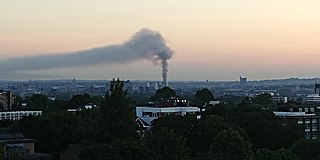
The division of labour is the separation of the tasks in any economic system or organisation so that participants may specialise (specialisation). Individuals, organisations, and nations are endowed with or acquire specialised capabilities, and either form combinations or trade to take advantage of the capabilities of others in addition to their own. Specialised capabilities may include equipment or natural resources as well as skills. Training and combinations of equipment and other assets acting together are often important. For example, an individual may specialise by acquiring tools and the skills to use them effectively just as an organisation may specialise by acquiring specialised equipment and hiring or training skilled operators. The division of labour is the motive for trade and the source of economic interdependence.
Labour laws, labour code or employment laws are those that mediate the relationship between workers, employing entities, trade unions, and the government. Collective labour law relates to the tripartite relationship between employee, employer, and union.
Industrial relations or employment relations is the multidisciplinary academic field that studies the employment relationship; that is, the complex interrelations between employers and employees, labor/trade unions, employer organizations, and the state.
The Hutton Inquiry was a 2003 judicial inquiry in the UK chaired by Lord Hutton, who was appointed by the Labour government to investigate the controversial circumstances surrounding the death of David Kelly, a biological warfare expert and former UN weapons inspector in Iraq.

Employment is a relationship between two parties regulating the provision of paid labour services. Usually based on a contract, one party, the employer, which might be a corporation, a not-for-profit organization, a co-operative, or any other entity, pays the other, the employee, in return for carrying out assigned work. Employees work in return for wages, which can be paid on the basis of an hourly rate, by piecework or an annual salary, depending on the type of work an employee does, the prevailing conditions of the sector and the bargaining power between the parties. Employees in some sectors may receive gratuities, bonus payments or stock options. In some types of employment, employees may receive benefits in addition to payment. Benefits may include health insurance, housing, and disability insurance. Employment is typically governed by employment laws, organization or legal contracts.

An Inquiry into the Nature and Causes of the Wealth of Nations, generally referred to by its shortened title The Wealth of Nations, is the magnum opus of the Scottish economist and moral philosopher Adam Smith (1723–1790). First published in 1776, the book offers one of the world's first connected accounts of what builds nations' wealth, and has become a fundamental work in classical economics. This is the first formulation of a comprehensive system of political economy. Reflecting upon economics at the beginning of the Industrial Revolution, Smith addresses topics such as the division of labour, productivity, and free markets.
Human resource management (HRM) is the strategic and coherent approach to the effective and efficient management of people in a company or organization such that they help their business gain a competitive advantage. It is designed to maximize employee performance in service of an employer's strategic objectives. Human resource management is primarily concerned with the management of people within organizations, focusing on policies and systems. HR departments are responsible for overseeing employee-benefits design, employee recruitment, training and development, performance appraisal, and reward management, such as managing pay and employee benefits systems. HR also concerns itself with organizational change and industrial relations, or the balancing of organizational practices with requirements arising from collective bargaining and governmental laws.
This article gives detailed information on the employment situation in Hong Kong.

In law, a trial is a coming together of parties to a dispute, to present information in a tribunal, a formal setting with the authority to adjudicate claims or disputes. One form of tribunal is a court. The tribunal, which may occur before a judge, jury, or other designated trier of fact, aims to achieve a resolution to their dispute.
The Grunwick dispute was a British industrial dispute involving trade union recognition at the Grunwick Film Processing Laboratories in Chapter Road, Dollis Hill in the London suburb of Willesden, that led to a two-year strike between 1976 and 1978.
MOSAIC threat assessment systems (MOSAIC) is a method developed by Gavin de Becker and Associates to assess and screen threats and inappropriate communications.

A union organizer is a specific type of trade union member or an appointed union official.

Indian labour law refers to law regulating labour in India. Traditionally, the Indian government at the federal and state levels has sought to ensure a high degree of protection for workers, but in practice, this differs due to the form of government and because labour is a subject in the concurrent list of the Indian Constitution. The Minimum Wages Act 1948 requires companies to pay the minimum wage set by the government alongside limiting working weeks to 40 hours. Overtime is strongly discouraged with the premium on overtime being 100% of the total wage. The Payment of Wages Act 1936 mandates the payment of wages on time on the last working day of every month via bank transfer or postal service. The Factories Act 1948 and the Shops and Establishment Act 1960 mandate 18 working days of fully paid vacation or earned leaves and 7 casual leaves each year to each employee, with an additional 7 fully paid sick days. The Maternity Benefit (Amendment) Act, 2017 gives female employees of every company the right to take 6 months' worth of fully paid maternity leave. It also provides for 6 weeks worth of paid leaves in case of miscarriage or medical termination of pregnancy. The Employees' Provident Fund Organisation and the Employees' State Insurance, governed by statutory acts provide workers with necessary social security for retirement benefits and medical and unemployment benefits respectively. Workers entitled to be covered under the Employees' State Insurance are also entitled to 90 days worth of paid medical leaves. A contract of employment can always provide for more rights than the statutory minimum set rights. The Indian parliament passed four labour codes in the 2019 and 2020 sessions. These four codes will consolidate 44 existing labour laws. They are: The Industrial Relations Code 2020, The Code on Social Security 2020, The Occupational Safety, Health and Working Conditions Code, 2020 and The Code on Wages 2019. Despite having one of the longest working hours, India has one of the lowest workforce productivity levels in the world.
The sexual abuse in the Roman Catholic Diocese of Cloyne was investigated by the Commission of Investigation, Dublin Archdiocese, Catholic Diocese of Cloyne, examining how allegations of sexual abuse of children in the diocese were dealt with by the church and state. The investigation, which resulted in the publication of the Cloyne Report in July 2011, was led by Judge Yvonne Murphy. The inquiry was ordered to look at child protection practices in the diocese and how it dealt with complaints against 19 priests made from 1996.
The Report of the committee of inquiry on industrial democracy (1977) Cmnd 6706, also the Bullock Report for short, was a report proposing for a form of worker participation or workers' control, chaired by Alan Bullock. The idea was seen by some as a way to solve the chronic industrial disputes and to enhance participation of employees in their workplace.
A grievance is a formal complaint that is raised by an employee towards an employer within the workplace. There are many reasons as to why a grievance can be raised, and also many ways to go about dealing with such a scenario. Reasons for filing a grievance in the workplace can be as a result of, but not limited to, a breach of the terms and conditions of an employment contract, raises and promotions, or lack thereof, as well as harassment and employment discrimination.
South African labour law regulates the relationship between employers, employees and trade unions in the Republic of South Africa.
Industrial democracy is an arrangement which involves workers making decisions, sharing responsibility and authority in the workplace. While in participative management organizational designs workers are listened to and take part in the decision-making process, in organizations employing industrial democracy they also have the final decisive power.
The law for workplace bullying is given below for each country in detail. Further European countries with concrete antibullying legislation are Belgium, France, and The Netherlands.

The Grenfell Tower Inquiry is a British public inquiry into the Grenfell Tower fire, which killed 72 people and destroyed Grenfell Tower on 14 June 2017. It was ordered by Prime Minister Theresa May on the day following the fire.






